Xinjiang’s cuisine, known for its fresh and delectable dishes, has many locals salivating at just the mere mention of its name. Take, for example, the famous Dapanji, or “大盘鸡,” which we shared earlier. In this extraordinary region, dramatic temperature swings between day and night and the abundant daylight create the perfect conditions for producing top-quality ingredients that’re second to none. The locals masterfully transform these ingredients into exquisite dishes that’re hearty and flavorful.
So get ready for another Xinjiang food adventure as we take you to Loulan, an authentic Xinjiang Uyghur restaurant in Frankfurt, to unlock more of these remarkable flavors. While Loulan offers a variety of popular Chinese dishes from across the country, our mission is to spotlight the iconic dishes that truly reflect the charming essence of Xinjiang.
Restaurant Profile
- Name of the Restaurant: 楼兰新疆餐厅 Loulan Xinjiang Uyghur Restaurant (menu)
- Adress: Kaiserstraße 41, 60329 Frankfurt am Main
- Style: Uyghur, Xinjiang, Chinese Cuisine
- Price: around 30 – 40 EUR per Person (incl. drinks and tips)
Ding Ding Chao Mian (丁丁炒面) or “Diced Stir-Fried Noodles” is a true local favorite, celebrated for its vibrant flavors and satisfying textures. It’s a must-try in Xinjiang restaurants, loved for its rich, savory taste and hearty ingredients.

Unlike typical noodles dishes, Ding Ding Chao Mian is characterized by small, diced pieces of hand-pulled noodles. These noodle cubes are bouncy, slightly chewy, and never sticky, allowing them to absorb the flavorful sauce and spices brilliantly. Seasoned with a blend of cumin, chili, and garlic, Ding Ding Chao Mian offers a delightful kick of spiciness and umami. Mixed with fresh bell peppers, tomatoes, onions, green beans, celery, and tenderpieces of lamb or beef (your choice), this well-rounded dish is packed with flavor and nutrition.
Nang Bao Rou (馕包肉), or Nan Bread with Braised Lamb, is a shining star among Xinjiang’s top ten classic dishes. This culinary treasure features tender lamb ribs, slow-cooked with a blend of aromatic spices and vegetables, all served on freshly baked flatbread known as “nan.”
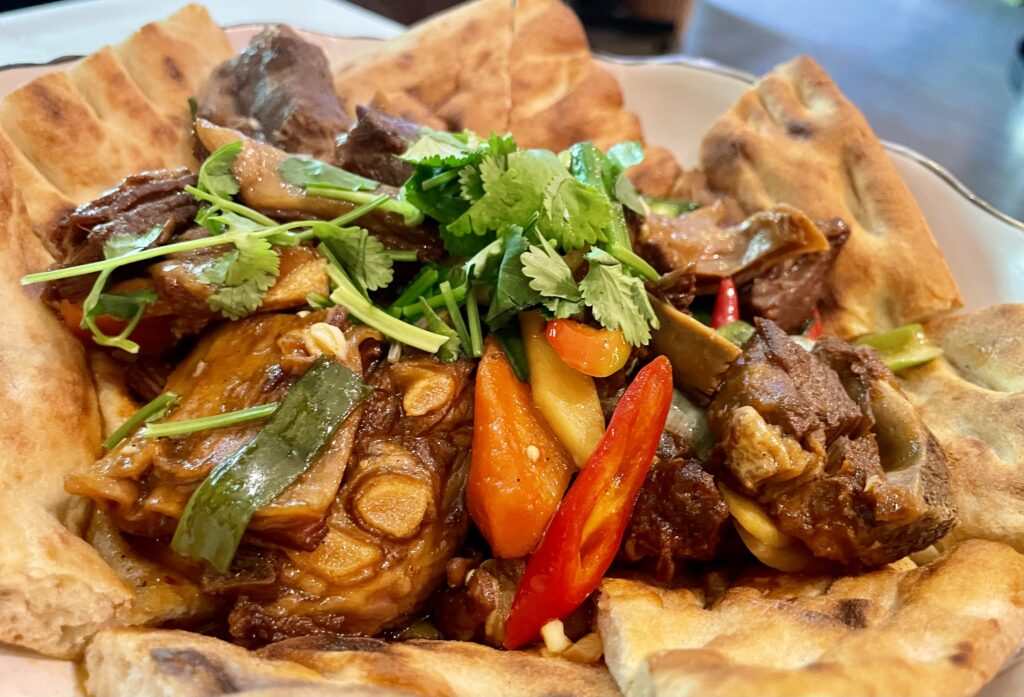
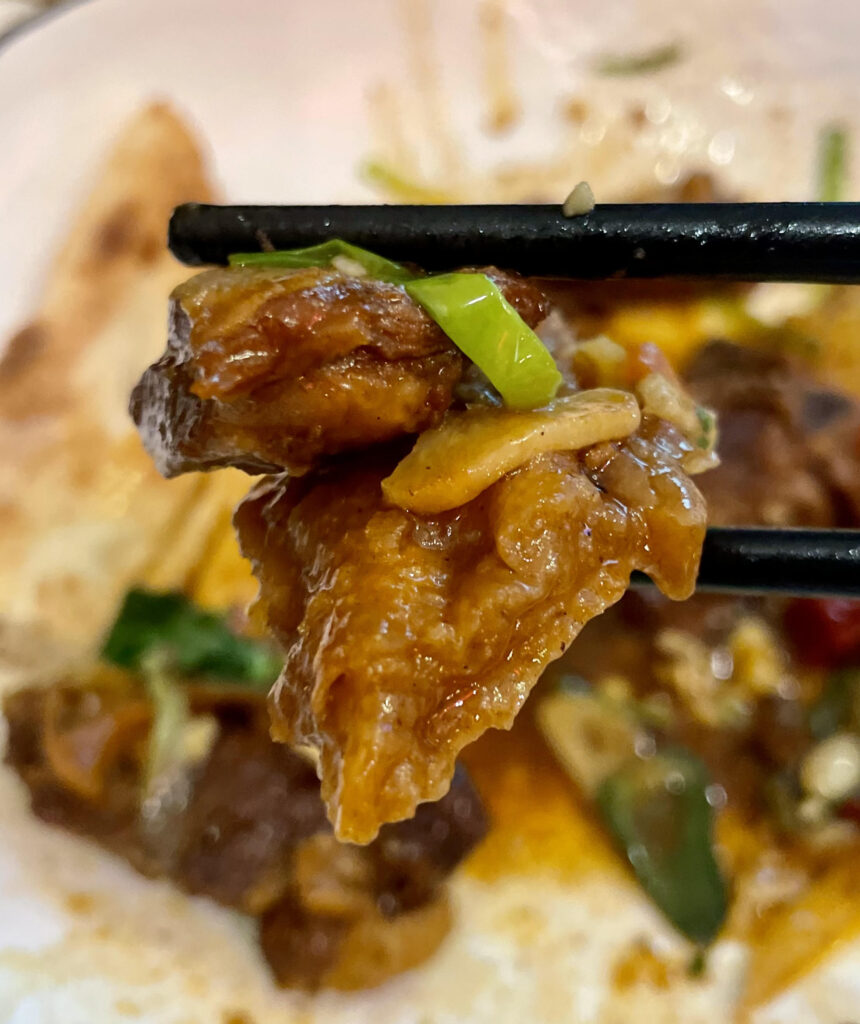
The lamb is braised with a tantalizing mix of bay leaves, cumin, coriander, ginger, garlic, onions, and chili, infusing it with a deep, savory flavor. Cooked to until it’s incredibly juicy and falling apart, the lamb soaks up all the aromatic spices, making every bite succulent and full of robust meaty aroma.
The crunchy nan bread, cut into eight pieces, is the ideal base. As it sponges up the rich, spiced broth, the bread becomes irresistibly soft and puffed with flavorful goodness. Enjoy it with lamb and veggies, complemented by just the right amount of oiliness and lamb fat. Each mouthful bursts with savory richness and subtle sweetness—warm, mouthwatering, and deeply gratifying.
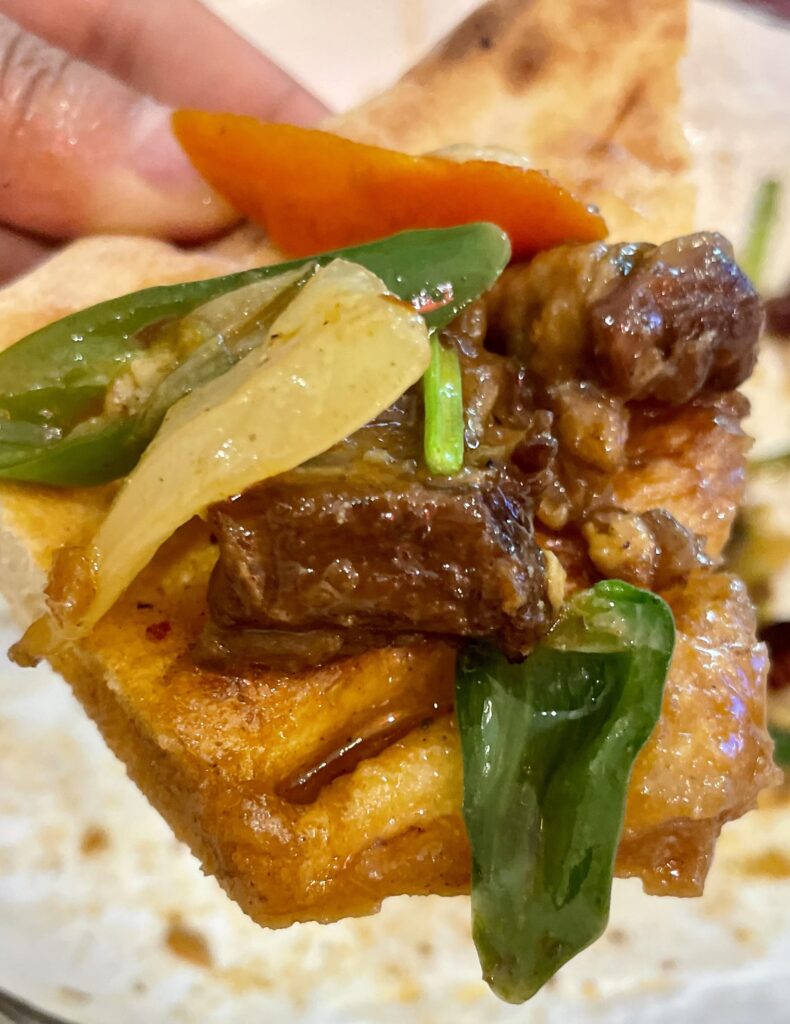
Manta with Lamb from the Oven (烤包子 Kao Bao Zi) is a delicious treat featuring two hearty dumplings filled with seasoned lamb, baked in a traditional oven called “nang pit” (馕坑).

These dumplings boast a crispy exterior while keeping the filling moist and juicy. As the manta bakes, each emerges with a golden, shiny skin, sprinkled with white and black sesame seeds, resembling small, gorgeously wrapped gifts.
The dough is slightly thicker than typical Chinese dumplings, preventing any loss of the savory juices during baking. The result is succulent lamb interior that bursts with flavor.
Made from fresh, evenly marbled leg meat, the perfect balance of lean and fat ensures optimal taste. Adding onions, cumin powder and black pepper not only effectively removes the gaminess of the lamb but also balances out the high fat content, making the dumplings nutritious, rich in taste and never greasy. This paring method is a testament to the centuries-old culinary wisdom of the Uyghur people.
Sinking your teeth into the crispy skin, the release of tender meat and rich lamb juices, mixed with aromatic spices, will take you straight to pure bliss.
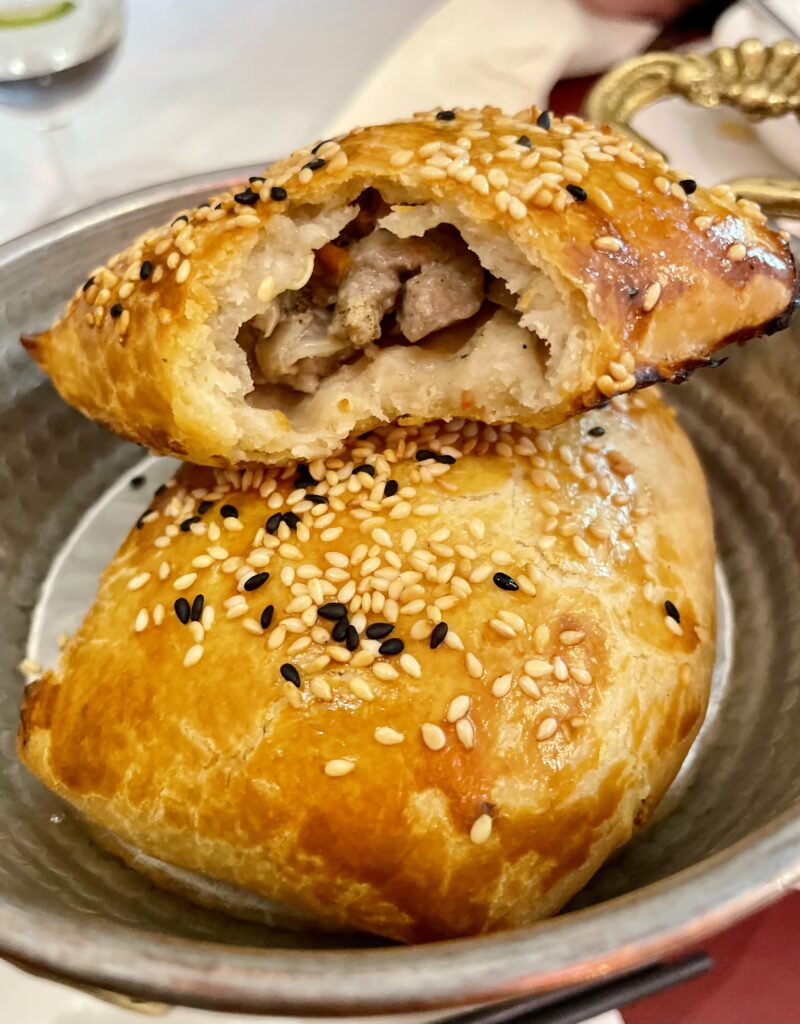
If you love Xinjiang flavors, especially its lamb dishes, you can’t miss the Grilled Lamb Chops (烤羊排 Kao Yang Pai), a delicious reflection of Xinjiang’s nomadic traditions and its vast, rugged landscapes. This dish features three oversized lamb chops, adorned with fresh chili, onions, and cilantro.

Lamb is a cornerstone of Xinjiang cuisine, stemming from a tradition deeply rooted in its history and culture. The region’s nomadic heritage and abundant natural grazing lands make lamb a popular staple. Raised in expansive, free-range environments, the animals produce lamb meat that is finely textured and full of flavor.
At Loulan, they bring that superior flavor right to Frankfurt. The high-quality lamb chops are marinated in a blend of spices like cumin, chili, garlic, and ginger for several hours, allowing the flavors to deeply penetrate the meat.
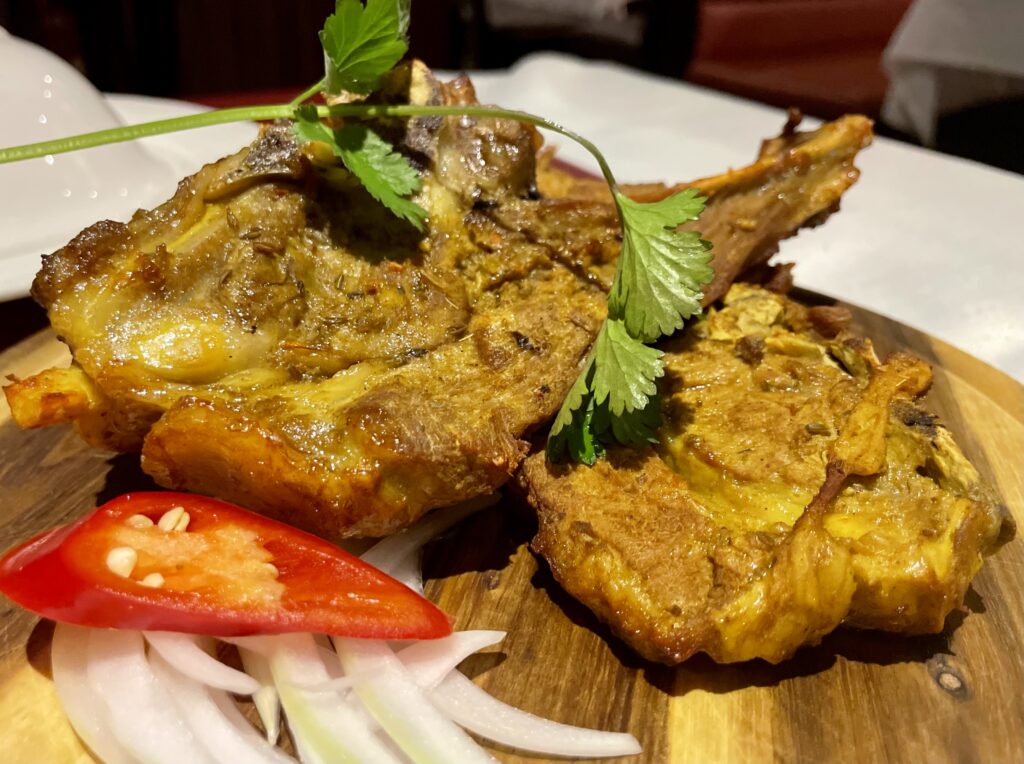
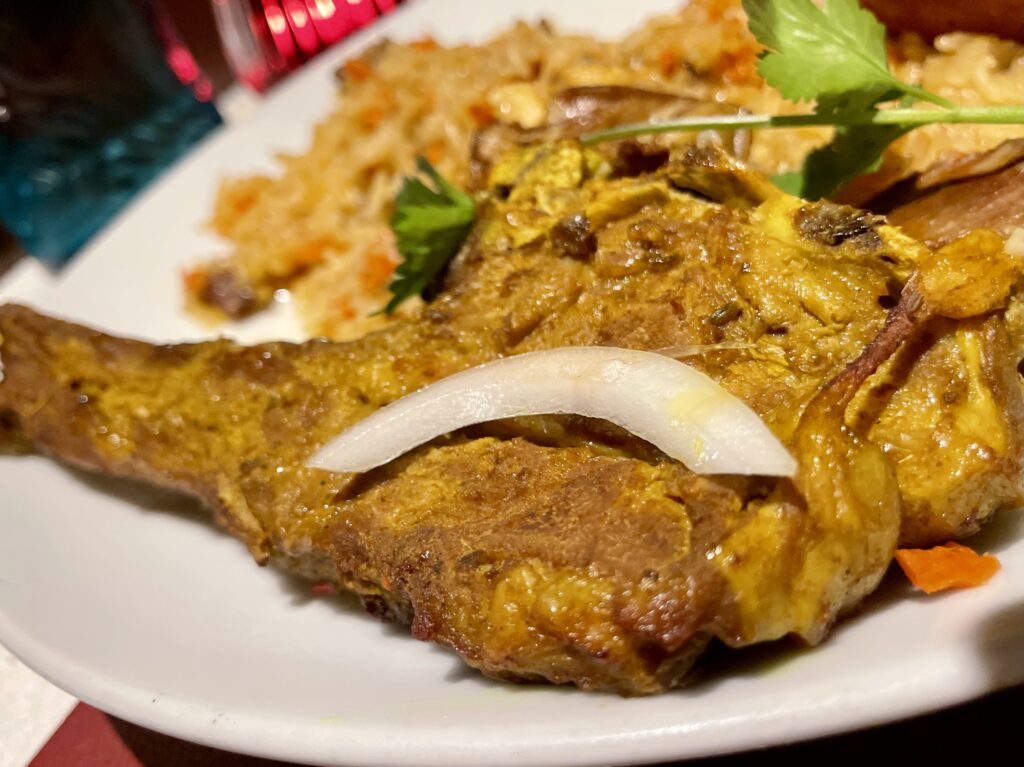
During the slow-roasting process, the fat melts into the natural juices, giving the chops a glistening appearance while developing a smoky, rich flavor. The result is lamb chops with a lightly charred, caramelized crust and a tender, succulent interior. Each bite bursts with the naturally robust and earthy flavors of the lamb, enhanced by the aromatic marinade – a spicy kick from chili and ginger, and comforting warmth from cumin – an unforgettable taste of Xinjiang’s culinary essence.
Pilaf (羊肉手抓饭 Yang Rou Shou Zhua Fan) is a staple in Xinjiang cuisine, beloved for its rich flavors and comforting appeal. Known as “Polo” in Uyghur, this traditional dish is a favorite for special occasions and welcoming guests.
At its heart, Xinjiang Pilaf features fluffy, aromatic rice cooked with carrots, onions, and tender, slow-braised chunks of lamb. The lamb is marinated with a mix of cumin, cinnamon, and a hint of chili, creating a warm, earthy flavor. The glossy, golden rice is rich but not greasy, with each grain soaked in the savory juices and fragrant spices.
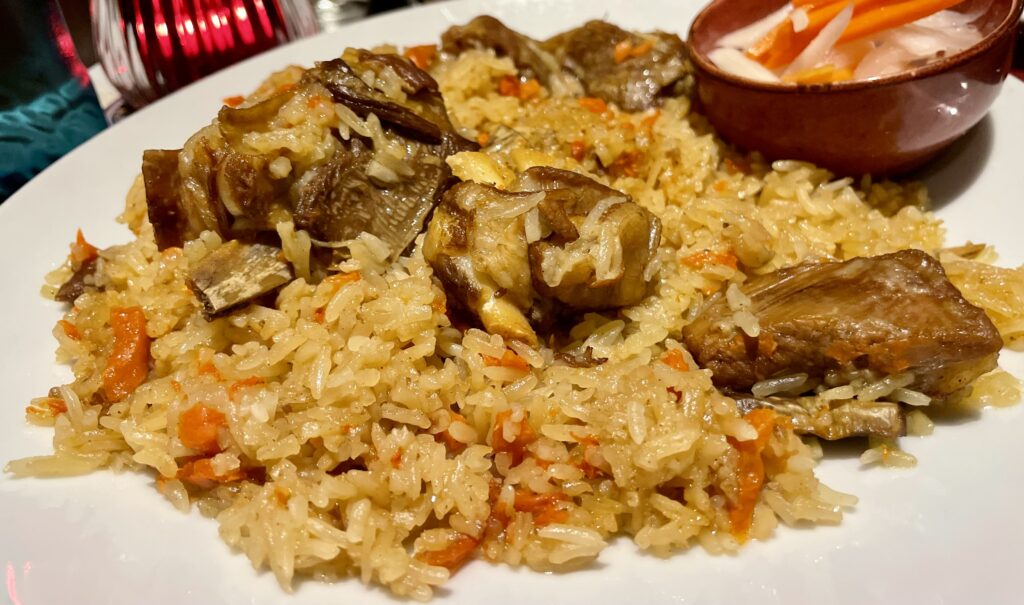
Each bite of the generously-sized lamb pieces reveals exceptional tenderness, falling off the bone and melting in the mouth. Caramelized carrots and onions add a touch of sweetness and vibrance, complementing the rich, spiced meat. Pickled carrots and radishes on the side provide a tangy contrast to the robust flavors of the lamb.
Legend has it that over a thousand years ago, a healer named Abul Aili Yibisina, struggling with illness, created this dish as a remedy. He combined lamb, rice, carrots, onions, and both vegetable and sheep fat, simmering it into a dish so delicious and nourishing that it restored his appetite and health. Legend or not, one thing is certain: Pilaf is a nutritious dish that is sure to whet your appetite.
Fish with Tofu Bosten Lake Style (博斯腾湖鱼泡豆腐 Bo Si Teng Hu Yu Pao Dou Fu) is my favorite at Loulan. The dish begins with fresh fish, cleaned and cut into manageable pieces, then pan-fried to a golden crip before being gently simmered in a flavorful broth alongside smooth tofu cubes and spinach. As the fish cooks, it releases its juices, blending with spices like ginger, garlic, and green onions to create a deeply aromatic broth. The bones are present but large, making the fish easy to enjoy.
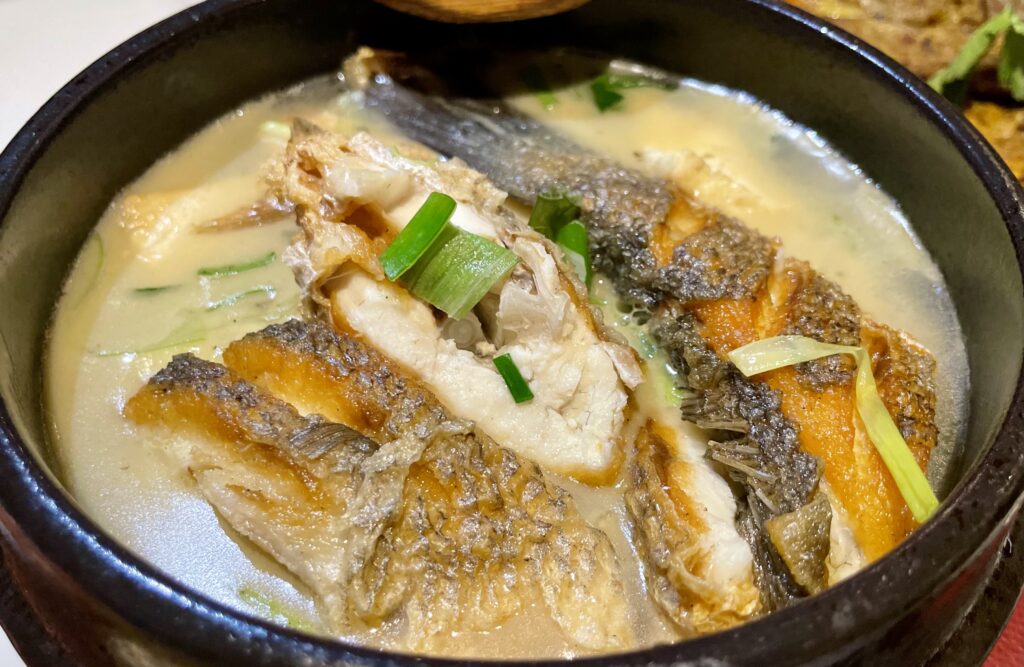
What makes Bosten Lake style so special? Journey south from Urumqi into the Yanqi Basin, and you’ll find the crystal-clear waters of Bosten Lake, China’s largest inland freshwater lake. On its western shore is Bohu County, renowned for its pristine waters and delicious fish.
In Bohu, charming fish restaurants and inns abound, and the town’s natural purity—free from industrial pollution—creates the ideal environment for wildlife to thrive. The saying “good water breeds good fish” rings true here.
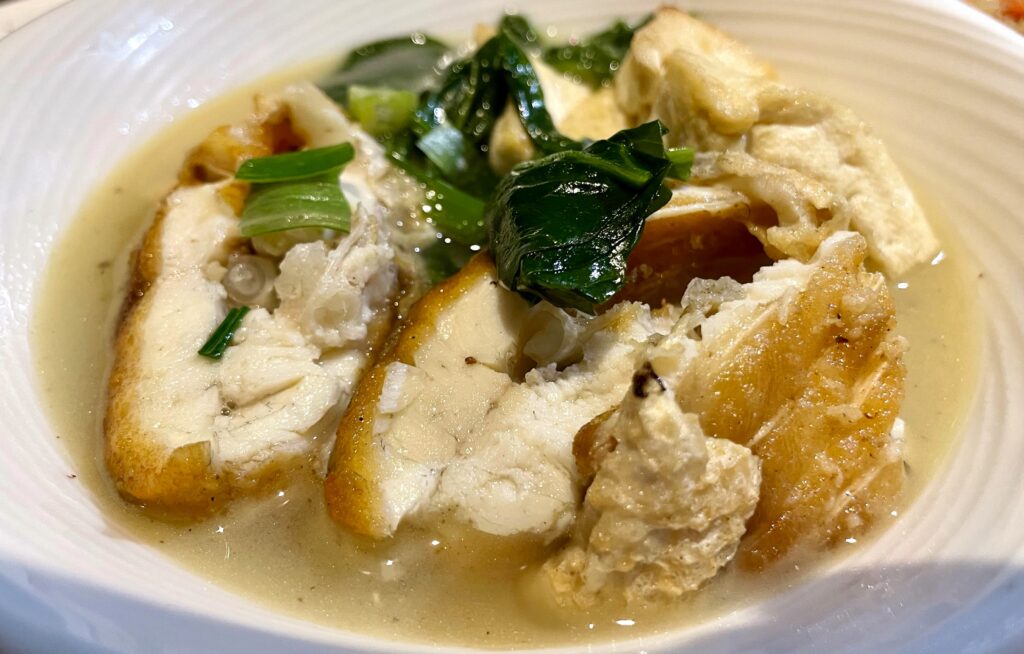
Bohu’s fish is so fresh that it needs only the simplest preparation to shine. Loulan’s chef skillfully brings this style to Frankfurt. The milky-white fish soup comes from slow-cooking over a gentle flame, releasing an aromatic fragrance that fills the air. Seasoned with just salt, and pepper, the soup’s simplicity is its strength. Each spoonful is warm, nourishing, a comforting embrace – as pure and straightforward as the people of Bohu, and as vast and passionate as Bosten Lake itself.
Loulan is a mysterious, vanished kingdom once thriving along the Silk Road, vibrant with the buzz of caravans and the prosperity of Silk Road trade. Its sudden disappearance remains one of the world’s greatest enigmas.
As the ancient echoes of this lost kingdom fade into the sands of time, a taste of history’s grandeur seems to come back to life at Loulan restaurant. As many dishes are crafted with ritualistic elegance, artfully arranged and served on exquisite plates, their dedication to honoring the spirit of timelessness and allure is evident. Some of the intricately prepared dishes are rarely seen elsewhere in Germany, such as lamb hoof, an entire roasted lamb, each intends to tell a story of this distant land and its forgotten glories. It’s no exaggeration to call Loulan a beacon of tradition and flavor, living up to the majesty of its namesake.
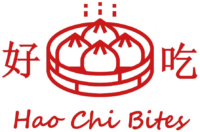
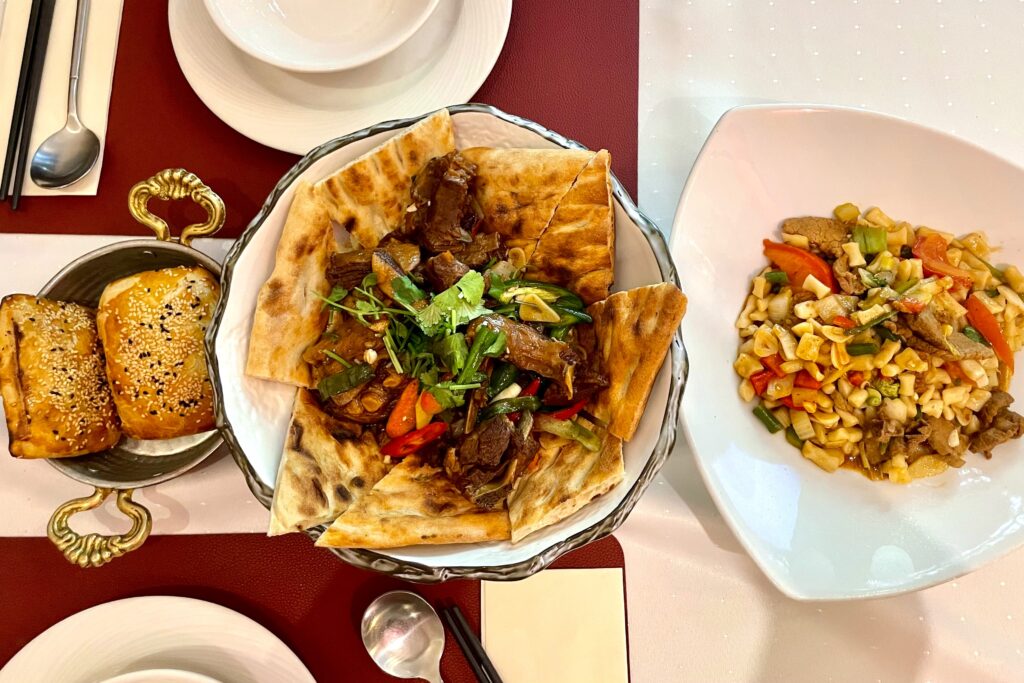
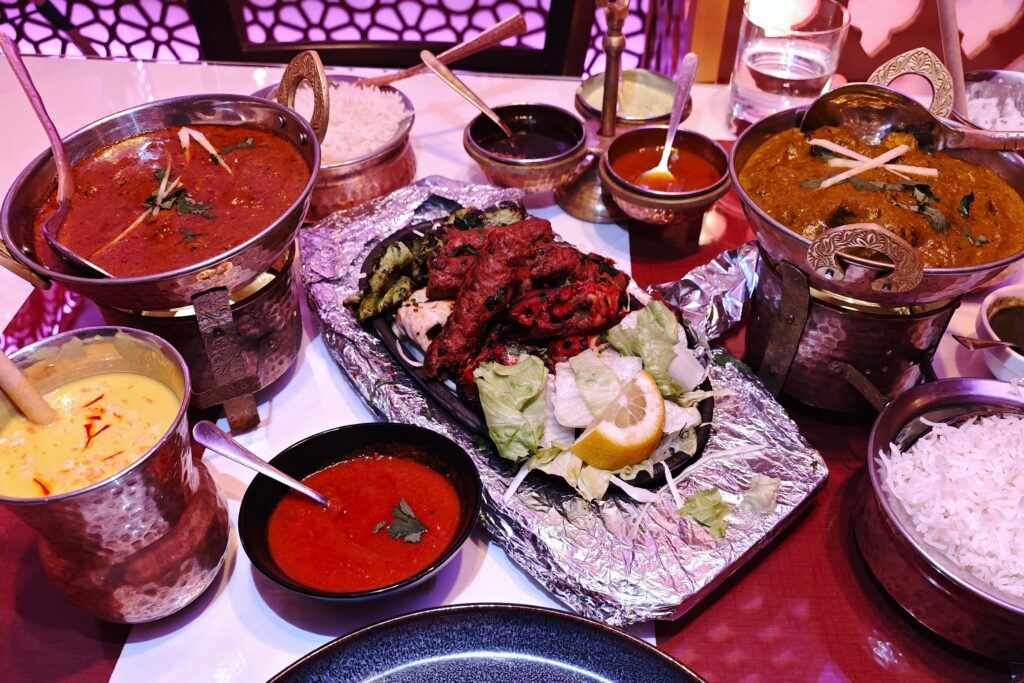
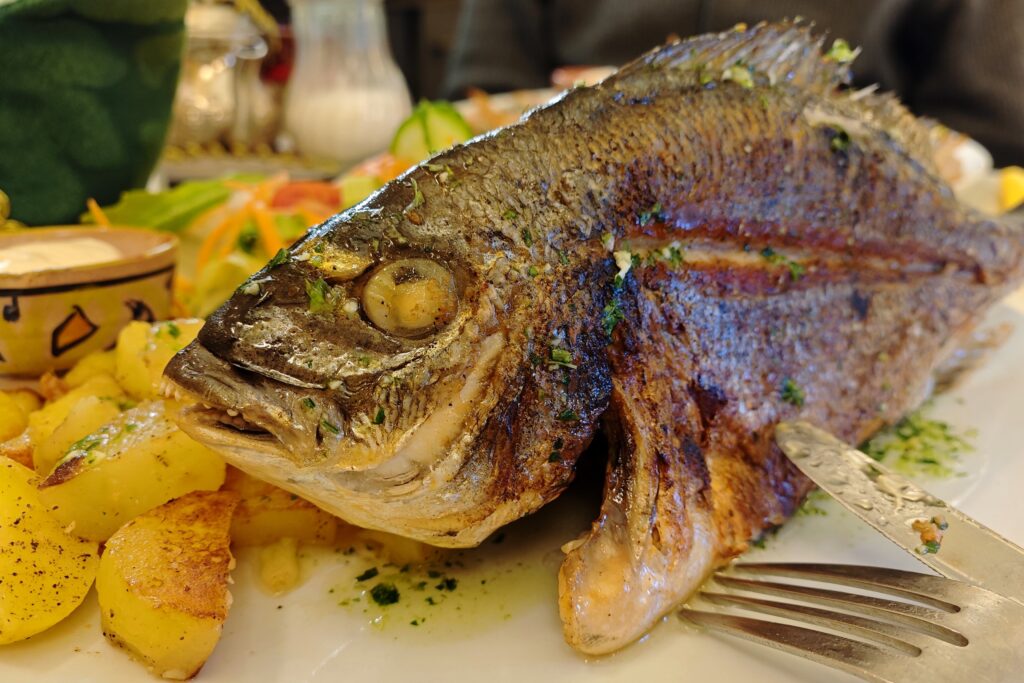
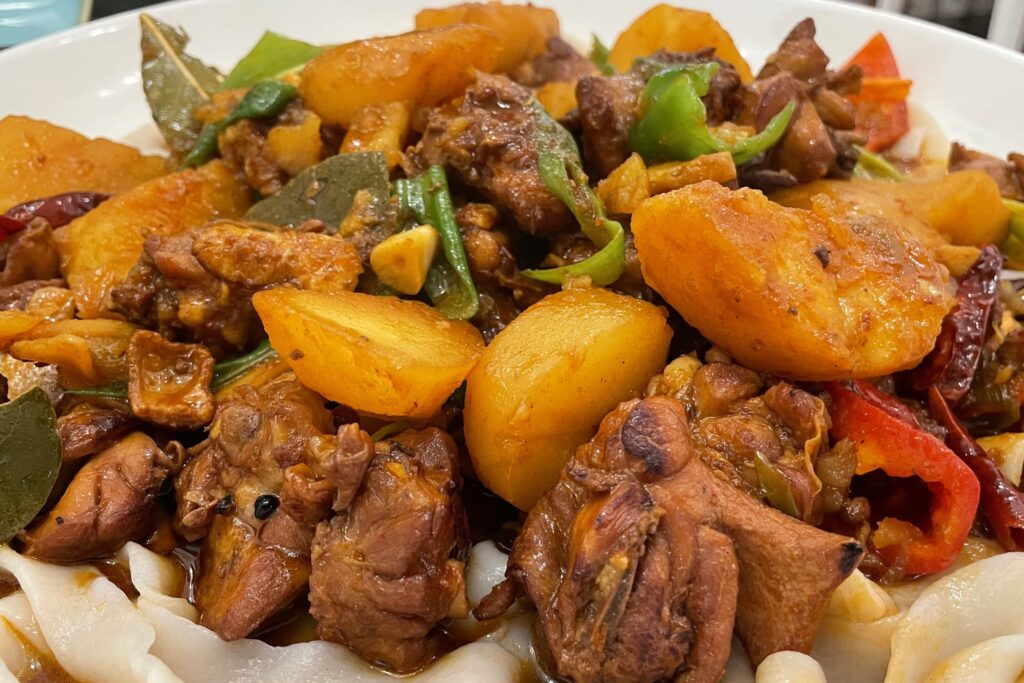
This article is great. Thanks!
Fantastic website you have here but I was curious about if you knew of any discussion boards that cover the same topics discussed in this article?
I’d really love to be a part of online community where I can get suggestions from other knowledgeable individuals that share the same interest.
If you have any recommendations, please let me know.
I’ve been browsing online more than 2 hours today,
yet I never found any interesting article like yours.
It’s pretty worth enough for me. Personally, if all site owners and bloggers made good
content as you did, the internet will be a lot more useful than ever before.
I could not resist commenting. Exceptionally written!
I will immediately clutch your rss as I can not find your email subscription link or newsletter service.
Do you have any? Kindly let me know so that I may subscribe.
Thanks.
Hey! Thanks for the comment😊 Sure thing, just scroll all the way down, and you’ll find the subscription section. Let us know if you need help with anything else!
I love reading through a post that can make men and women think.
Also, thank you for allowing me to comment!
I really like looking through an article that can make people think. Also, thanks for allowing me to comment!
Thank you for your comment! We’re glad you enjoyed the article 🙂
Wonderful blog! I found it while swarching on Yahoo News.
Do you have any suggestions on how to get listed in Yahoo News?
I’ve been trying for a while but I never seem to get there!
Many thanks
Thank you so much! 😊 We’re happy to know you found the blog through Yahoo News! Honestly, getting featured there may be a bit of luck… Although we don’t have any direct tips, focusing on SEO, writing timely articles, and sharing on social platforms might help. Best of luck — we might just see your content up there soon!